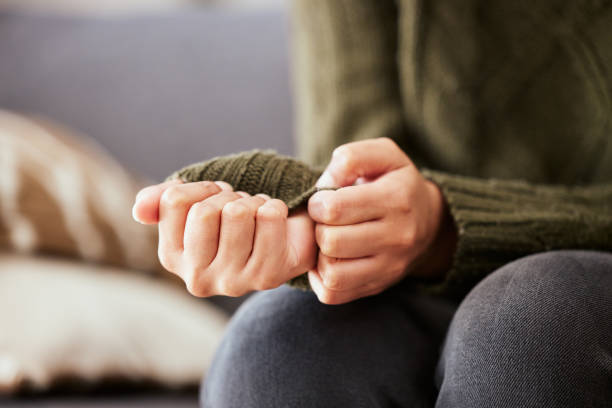
Have you ever felt like your anxiety gets worse before or after alcohol use? Dealing with anxiety can lead to a myriad of attempted coping strategies, alcohol among them. No matter when you first start consuming alcohol, you may find that you have experienced periods of your life where your relationship with drinking causes you to feel uncomfortable. Could there be a relationship between your alcohol use and anxiety that needs more attention?
It is common that you may have been turning to alcohol when feeling unpleasant emotions, only to find yourself having more of these unpleasant emotions, such as anger, sadness, and anxiety, after consumption. The cycle of alcohol consumption and anxiety is one that, unfortunately, often perpetuates itself.
What is “HangAnxiety”?

“HangAnxiety” is the experience of heightened anxiety or increased feelings of nervousness, worry, or unease that can occur after consuming alcohol. This phenomenon is particularly prevalent among individuals with underlying anxiety disorders or those who are sensitive to the effects of alcohol on their mood.
Managing “HangAnxiety” involves understanding the interplay between alcohol and anxiety, adopting healthier coping mechanisms, and seeking appropriate support when needed. By taking proactive steps to manage both anxiety and alcohol consumption, individuals can improve their overall well-being and achieve greater mental and emotional balance.
3 Ways to Manage Anxiety and Alcohol
1) Track your mood and alcohol use:

You cannot address what you don’t understand and accept. Let’s start with identifying and tracking your mood and unhealthy patterns, including but not limited to alcohol use and excessive time spent on the internet or phone, which can all act as escape behaviors. You might wonder why being on your phone is an issue if you feel that your consumption of alcohol is the real problem. Escapism and distraction can point to underlying issues, and it is often not enough to abstain from one behavior if the feelings and thoughts that create the need for that behavior aren’t addressed.
If your emotional state is causing you to reach for alcohol, then it is an understanding of your emotional state that will help you determine steps to feel better. It will never be enough to “put the plug in the jug” and carry on without addressing why you felt the need to drink in the first place. You may determine, through consideration and behavioral therapy, that you no longer wish to consume alcohol. You may also decide that you can have some drinks without feeling disrupted once you have done the work on regulating your mood and resolving your issues through healthy coping mechanisms. Either of these outcomes may be the best for you; analyzing your mood is how to know what will work best in your situation.
Utilize mindfulness when you are keeping track of your thoughts, feelings, and correlating alcohol use. Mindfulness is the act of noticing what is happening without judgment. You may want to adopt a meditative practice while you go through this process. You can use meditation both to notice what is going on for you and to help you regulate when triggered.
What triggers your drinking? Is it a specific mood or a level of intensity? Is it the end of the day or the work week? You might find that certain situations are more triggering than others. Some might trigger you to reach for a drink immediately. Others might need to accumulate in order for you to think about your desire for alcohol. No matter how intense the trigger, it is beneficial to identify them. These triggers relate to a pain point that you can work to alleviate to lower your stress and anxiety.
How do you feel the next day? The cycle of feeling bad about drinking and ameliorating that anxiety with drinking is a common one. Every time the cycle repeats, it feels more extreme, as guilt and shame can begin to pile up. You may feel behind all day and not quite able to get your stride in your life, whether you are working, running errands, caring for others, or caring for yourself. As you feel the urge to drink again, you may feel a worsening depression and hopelessness that you are already struggling yet craving the thing that is in your way. Do these feelings change when you manage to have a good day despite having drank the night before? Or do you feel anxiety anyway, knowing that that wasn’t the usual outcome and that it won’t last?
2) Explore Alternative Coping Mechanisms:

Instead of relying on alcohol to manage stress or anxiety, explore alternative coping mechanisms. Engage in regular exercise, meditation, or deep breathing exercises to alleviate stress and promote relaxation. Building a repertoire of healthy coping strategies can reduce the temptation to turn to alcohol during times of anxiety.
Take a look at your self-care routine. How often do you revisit it to ensure it still works for you? We see a lot of messages online about “what caring for yourself should look like,” but the truth is that every person has a unique life and lifestyle that impacts what best constitutes self-care for them. Always begin with your basics: rest, nutrition, hydration, and movement. How is your sleep hygiene; have you set a sleep schedule, and do you stick to it? Have you created a welcoming and effective sleep environment with the right temperature and brightness? Do you eat enough food, or do you skip meals? How much access do you have to nutrient-rich foods that help your body maintain and repair itself? Not everyone has the same access; food allergies and sensitivities can make nutrition challenging. Are you listening to your body to determine hunger and satiety? Do you drink enough water? How can you add more water to your day if you are consistently thirsty? Signs of dehydration include body pain, headache, dry mouth, fatigue, dizziness, and darker and/or less-frequent urine.
Movement is a key for every living creature on this planet, but it is not one-size-fits-all. Depending on your ability and history with exercise, there will be a kind of movement that works best for you. You might go for walks, dance in your kitchen, take classes, join a rec sports league, go to the gym, or more. You may have a physical therapist or loved one who has learned how to move your limbs for you if you are confined to a chair or bed. The physical benefits of moving your body impact all systems, including the chemicals in your brain. Moving your body is not about punishing it or yourself but rather about caring for yourself and showing your body care. If you decide that the best movement for you is higher intensity, such as kickboxing or playing a contact sport, it can also be an excellent way to burn off stress and pent-up aggression.
Self-care is not complete without having fun, decompressing, and relaxing. You may choose to create or consume art, whether you paint, go to galleries, watch your favorite films, or sing in a choir. Consider taking a class, such as a cooking class, or even a class for something that interests you and stimulates your mind, such as history, languages, or creative writing. Who joins you when you have fun? Reach out to loved ones to join you for a meal, to talk about your days, take that class together, or any other activity you might enjoy sharing. Connection and communication let us know that we are not alone and have a safety net. It is harder to become isolated by anxiety when someone is checking in on you, and it is easier to choose self-care when you are not isolated.
Your lifestyle isn’t solely about navigating the tough times. You may be surprised to realize how often your happiness factors into your consumption of alcohol. How will you approach situations of happiness, where in the past, you might have decided that drinking was part of the celebration? Sometimes, people use alcohol to “enhance” the good feelings of a situation. This can be a surprising revelation for the clients who attend our Woodland Hills addiction recovery therapy sessions, and with good reason. The positive things we feel are less likely to have us calling for help. It is not the temporary experiences of alcohol, however, that determine your relationship with it. It is how you feel overall; how confident do you feel on your own without consuming alcohol? Contemplate how you might enjoy celebrating without drinking alcohol. What will you drink instead? How will you set boundaries with the people around you? Are there some situations you might want to avoid, or limit exposure to for a while?
3) Seek Professional Help and Support:

If you find that anxiety and alcohol use are significantly impacting your life, consider seeking professional help. Everyone is worthy of mental health support, and everyone can benefit from having someone to talk to. A therapist or counselor can work with you to develop personalized coping strategies and address underlying issues contributing to your anxiety. Cognitive-behavioral therapy (CBT) and other evidence-based treatments can be particularly effective in managing anxiety and substance use disorders through in-person and/or online addiction recovery therapy.
CBT is a method of determining what thoughts and feelings you are experiencing and how you respond to them, followed by an adjustment of behavior. When our reactions to our experiences transition from ineffective or harmful to beneficial, we are then able to experience more positive thoughts and feelings. Over time, positive actions become positive behaviors, which become a more positive outlook and increased self-confidence.
In confronting your substance use, you may come across patterns of self-destruction that need dealing with. Our patients who see us for addiction recovery therapy in Woodland Hills often come face to face with self-sabotage as they unpack their anxiety and the coping strategies they’ve employed so far in dealing with it. You may find that you experience conflicting feelings about seeking professional help; you may vary between feeling unworthy of help, feeling like you “shouldn’t” need help, telling yourself you don’t need help, and so on. Progress and consistency can happen with steps back and mishaps, and in fact, that is how most journeys go.
When you obtain professional support, you will find that you are able to safely explore your triggers and unpack your history that is contributing to your relationship with alcohol. If alcohol has been the most effective tonic for your anxiety so far, this process will be about understanding the anxiety itself and healing what can be healed in order to reduce your impulse to self-medicate. You may also have feelings about other coping methods you use or have used and their relationship to drinking alcohol as well, such as behaviors you only do when you’re drunk. There are no wrong answers or problems too big when you are determining how you got to where you are or where you might like to go.
Over time, you will be able to approach triggers differently than you have before, trying other methods of self-regulation such as deep breathing, exercise, affirmations, and more. You can also bring your trial-and-error of coping strategies into your sessions and obtain guidance in considering what works and what doesn’t work for you. Something you might have thought sounded great might not feel as good in practice; sometimes, these tactics just need tweaks in order to make them effective. Therapy can give you the tools to move forward, build the life that suits you best, and help with the setbacks and tough times that arise as part of human existence. Whether you’ve attended regular therapy in the past or not, there is always something to learn and a new set of challenges to take on as you evolve throughout your life. What you want to take on and how you feel about making a change matters more than any past attempts or experiences.
You may enter therapy with an idea of how you will recognize success; you might find that your definition of success changes are you begin to do the work. You may also realize that your relationship with success begins to expand through honest exploration. Mental health support isn’t only about figuring out and talking about what is going wrong but also what is going right. You will be able to celebrate milestones in your progress and will be encouraged to do so.

I have the honor of hearing about the replacement of guilt, fear, and shame with confidence and self-love as an addiction recovery counselor in Woodland Hills. This process is not a linear one, but benefits can be experienced immediately by those who accept that their anxiety and relationship with alcohol are intertwined in an unhealthy way. The first step is always to consider your needs and be honest with yourself about what you are experiencing. You deserve to experience a life with less anxiety and more comfort with your choices.
Addiction Recovery Therapy in Woodland Hills, CA
Here at Embracing You Therapy Group, we invite you to explore your relationship with addictive behaviors, whether that is a substance or an activity, and discuss with us how life would be different if you had more control over your unhealthy behaviors. We invite you to consider that it is possible to make changes in your life, get a hold of your destructive behaviors, and find the right tools to feel calm in your life.Contact us today for your complimentary 20-minute phone consultation with our Admin Team today!




